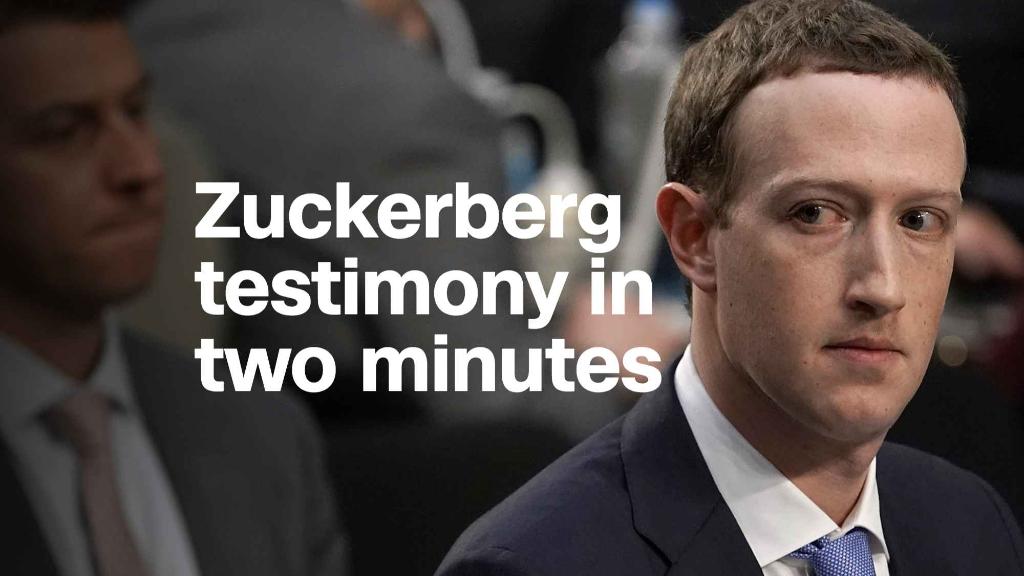
Congress doesn't understand Facebook.
Mark Zuckerberg emerged unscathed from Tuesday's Senate committee hearing, and he did so in large part because most of the senators who asked him questions had no clue how Facebook worked, what the solutions to its problems are, or even what they were trying to achieve by calling its CEO to testify, other than getting some good soundbites in.
What the first day of the Zuckerberg hearings made clear is that many American lawmakers are illiterate when it comes to 21st century technology.
As a result, the issue that was supposed to be the focus of the hearing -- "social media privacy and the use and abuse of data," as Sen. Chuck Grassley put it -- was but one among many. And at the moment when the country needed a smart conversation about privacy, what it got was meandering questions and misfires.
There were exceptions to the rule: Most notably, California Sen. Kamala Harris, who pressed Zuckerberg on his failure to explain how extensively Facebook tracked user activity beyond Facebook-owned platforms and why the company did not inform users in 2015 that their data had been shared with Cambridge Analytica.
Related: What to do if your Facebook data was exposed
But on multiple occasions, it seemed like lawmakers were simply asking Zuckerberg how Facebook worked. Several questions displayed an ignorance about the very basics of the platform and its business model.
"How do you sustain a business model in which users don't pay for your service?" Sen. Orrin Hatch asked.
"Senator, we run ads," Zuckerberg replied.
"How many data categories do you store, does Facebook store, on the categories that you collect?" Sen. Deb Fischer asked.
"Senator, can you clarify what you mean by data categories?" said the Facebook CEO. "I'm not actually sure what that is referring to."
In one of the most memorable exchanges, Sen. John Kennedy began by telling Zuckerberg that Facebook's user agreement "sucked," then listed off a number of steps Facebook should take to improve data privacy -- only to be repeatedly told by Zuckerberg that those measures were already in place.
Kennedy: "Are you willing to go back and work on giving me a greater right to erase my data?"
Zuckerberg: "Senator, you can already delete any of the data that's there or delete all of your data."
Kennedy: "Are you willing to expand my right to prohibit you from sharing my data?"
Zuckerberg: "Senator, again, I believe that you already have that control...."
Kennedy: "Are you willing to give me the right to take my data on Facebook and move it to another social media platform?"
Zuckerberg: "Senator, you can already do that...."
The senators' lack of understanding allowed Zuckerberg to evade important, unanswered questions about the extent of Facebook's data monitoring and why the company hasn't been more transparent with users how their data is used and how it's been abused.
The senators' questions also lacked focus. They ranged from issues like Russian meddling in the 2016 campaign to hate speech to a lack of transparency in election advertising -- all issues that have plagued Facebook in recent months, but all disparate problems that require different solutions.
Related: Facebook tries to get its house in order
Even on the data privacy issue, senators pressed the CEO for an explanation of why users could trust Facebook, rather than what concrete steps could be taken to give users greater control over their data and how it's shared. That gave Zuckerberg the opportunity to return to his familiar theme: Taking responsibility and making things better. They did not, for the most part, press him on why he hadn't done that years ago.
Perhaps the only time Zuckerberg truly seemed to be under pressure was when Harris pressed him to explain why Facebook did not disclose the Cambridge Analytica matter to the public in 2015, and why it waited until it was forced to do so by media reports this year.
"Are you aware of anyone in the leadership at Facebook who was in a conversation where a decision was made not to inform your users?" Harris asked. "Or do you believe no such conversation ever took place?"
"I am not sure whether there was a conversation about that," Zuckerberg said.
Other Senators posed seemingly important questions that Zuckerberg was able to evade because of the way they were phrased. He side-stepped questions about Facebook's use of personal data to earn advertising revenue by correcting Senators when they suggested Facebook sells that data. (It trades off the data, but technically doesn't sell it.)
Zuckerberg had gone through rigorous training sessions with lawyers, consultants and advisers in the days before the hearing. He was calm and authoritative throughout, and contrite and respectful as he took questions.
But there was no real challenge. Did Zuckerberg take responsibility? He did. Was Facebook responsible for protecting user content? It was. Was it open to regulation? Yes.
Whenever a lawmaker pointed out something Facebook had done wrong, he spoke about what the company was doing to make it right. Whenever he couldn't answer a question, he simply promised to get back to lawmakers later.
There was perhaps no clearer sign that Zuckerberg had been left unscathed than when, given the opportunity to take a break from questioning, he replied: "We can do a few more."

